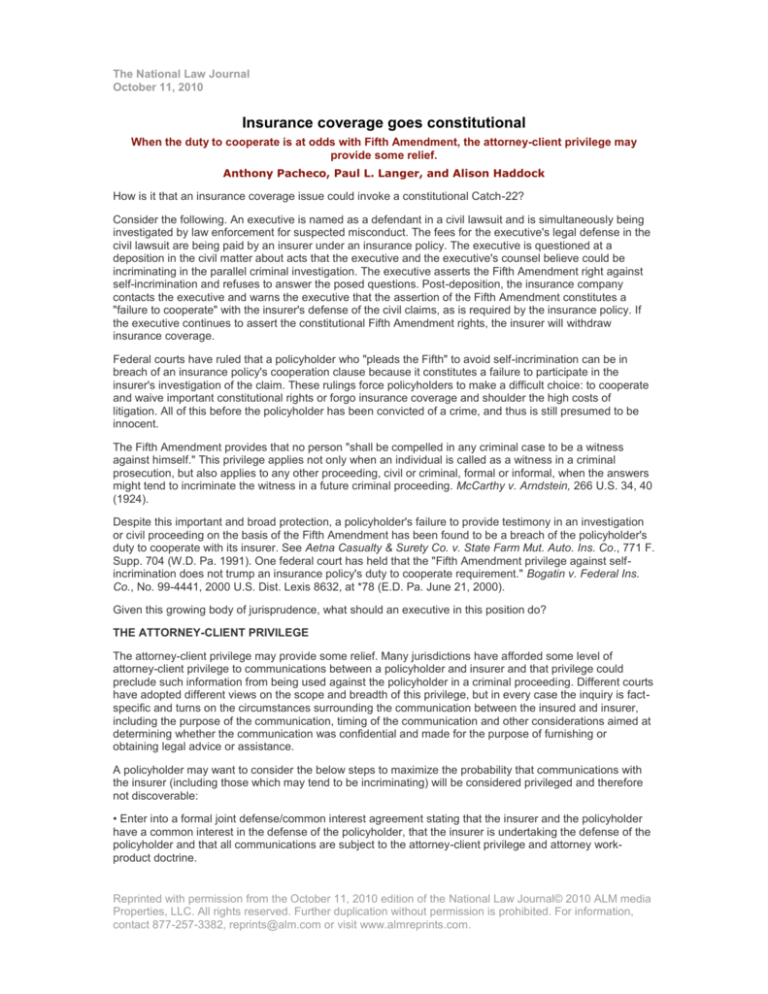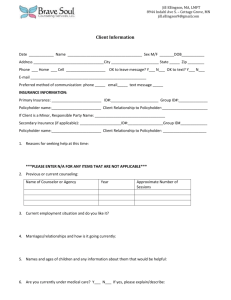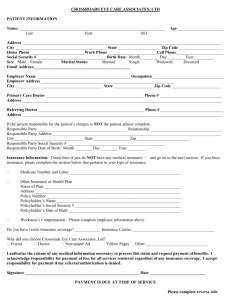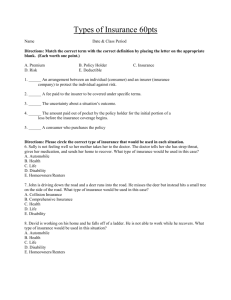
The National Law Journal
October 11, 2010
Insurance coverage goes constitutional
When the duty to cooperate is at odds with Fifth Amendment, the attorney-client privilege may
provide some relief.
Anthony Pacheco, Paul L. Langer, and Alison Haddock
How is it that an insurance coverage issue could invoke a constitutional Catch-22?
Consider the following. An executive is named as a defendant in a civil lawsuit and is simultaneously being
investigated by law enforcement for suspected misconduct. The fees for the executive's legal defense in the
civil lawsuit are being paid by an insurer under an insurance policy. The executive is questioned at a
deposition in the civil matter about acts that the executive and the executive's counsel believe could be
incriminating in the parallel criminal investigation. The executive asserts the Fifth Amendment right against
self-incrimination and refuses to answer the posed questions. Post-deposition, the insurance company
contacts the executive and warns the executive that the assertion of the Fifth Amendment constitutes a
"failure to cooperate" with the insurer's defense of the civil claims, as is required by the insurance policy. If
the executive continues to assert the constitutional Fifth Amendment rights, the insurer will withdraw
insurance coverage.
Federal courts have ruled that a policyholder who "pleads the Fifth" to avoid self-incrimination can be in
breach of an insurance policy's cooperation clause because it constitutes a failure to participate in the
insurer's investigation of the claim. These rulings force policyholders to make a difficult choice: to cooperate
and waive important constitutional rights or forgo insurance coverage and shoulder the high costs of
litigation. All of this before the policyholder has been convicted of a crime, and thus is still presumed to be
innocent.
The Fifth Amendment provides that no person "shall be compelled in any criminal case to be a witness
against himself." This privilege applies not only when an individual is called as a witness in a criminal
prosecution, but also applies to any other proceeding, civil or criminal, formal or informal, when the answers
might tend to incriminate the witness in a future criminal proceeding. McCarthy v. Arndstein, 266 U.S. 34, 40
(1924).
Despite this important and broad protection, a policyholder's failure to provide testimony in an investigation
or civil proceeding on the basis of the Fifth Amendment has been found to be a breach of the policyholder's
duty to cooperate with its insurer. See Aetna Casualty & Surety Co. v. State Farm Mut. Auto. Ins. Co., 771 F.
Supp. 704 (W.D. Pa. 1991). One federal court has held that the "Fifth Amendment privilege against selfincrimination does not trump an insurance policy's duty to cooperate requirement." Bogatin v. Federal Ins.
Co., No. 99-4441, 2000 U.S. Dist. Lexis 8632, at *78 (E.D. Pa. June 21, 2000).
Given this growing body of jurisprudence, what should an executive in this position do?
THE ATTORNEY-CLIENT PRIVILEGE
The attorney-client privilege may provide some relief. Many jurisdictions have afforded some level of
attorney-client privilege to communications between a policyholder and insurer and that privilege could
preclude such information from being used against the policyholder in a criminal proceeding. Different courts
have adopted different views on the scope and breadth of this privilege, but in every case the inquiry is factspecific and turns on the circumstances surrounding the communication between the insured and insurer,
including the purpose of the communication, timing of the communication and other considerations aimed at
determining whether the communication was confidential and made for the purpose of furnishing or
obtaining legal advice or assistance.
A policyholder may want to consider the below steps to maximize the probability that communications with
the insurer (including those which may tend to be incriminating) will be considered privileged and therefore
not discoverable:
• Enter into a formal joint defense/common interest agreement stating that the insurer and the policyholder
have a common interest in the defense of the policyholder, that the insurer is undertaking the defense of the
policyholder and that all communications are subject to the attorney-client privilege and attorney workproduct doctrine.
Reprinted with permission from the October 11, 2010 edition of the National Law Journal© 2010 ALM media
Properties, LLC. All rights reserved. Further duplication without permission is prohibited. For information,
contact 877-257-3382, reprints@alm.com or visit www.almreprints.com.
• Label all communications between the policyholder and the insurer as attorney-client privileged, commoninterest privilege (if applicable) and confidential.
• Ensure that all communications between the policyholder and the insurer are made through the attorney
representing the policyholder on the one hand and, if possible, an in-house attorney at the insurance
company on the other.
Although no guarantee that a court in the criminal proceeding will rule such communications to be subject to
the attorney-client privilege, these three steps may increase the possibility of a ruling in favor of the
policyholder.
COORDINATION WITH THE INSURANCE COMPANY
In addition to diligence in preserving and protecting privilege, the policyholder, the policyholder's criminal
defense counsel and insurance coverage counsel can work together to understand what the policyholder
must do to cooperate sufficiently with the insurer. Criminal defense counsel can evaluate whether some
information can be shared with the insurance company short of waiving important Fifth Amendment rights.
Although a difficult tightrope to walk, such efforts can ensure that sufficient information is provided to the
insurance company, thus inhibiting the insurer's efforts to claim a failure to cooperate.
As a general matter, the well-established "Garrity rule" could potentially be expanded to provide courts with
a mechanism to ensure that a policyholder's Fifth Amendment rights are protected and that policyholders do
not end up squeezed by these competing constitutional and financial interests.
Garrity v. New Jersey, 385 U.S. 493, 496-500 (1967), held that when an individual invokes Fifth Amendment
rights but then makes statements as a result of economic coercion, the statements are inadmissible in any
subsequent criminal case. Garrity was recently evoked by the U.S. Court of Appeals for the D.C. Circuit to
dismiss manslaughter indictments against Blackwater security guards, as the court found that the
government utilized coerced statements from the security guards in its prosecution. U.S. v. Slough, 677 F.
Supp. 2d 112 (D.D.C. 2009). "Coercion" sufficient to bar the use of a witness' statements in subsequent
criminal proceeding includes economic pressure like threats of loss of employment or business contracts.
Id.; see also Lefkowitz v. Turley, 414 U.S. 70, 84-5 (1973). The Garrity rule generally applies only when a
state actor, i.e. the federal or state government, applies the coercion, but statements coerced by private
companies acting on the state's behalf, such as when a company receives significant encouragement to
assist the government in an investigation, may also invoke the rule.
"Coercion" in the modern corporate context can arise in relation to U.S. Department of Justice
investigations. In these investigations, federal prosecutors will sometimes defer prosecution if a business will
cooperate with an investigation or prosecution of current or former employees. In a key case addressing the
issue, an employer's conditioning of payment of legal fees on witnesses' waiver of their Fifth Amendment
rights amounted to coercion. See U.S. v. Stein, 440 F. Supp. 2d 315, 330-32 (S.D.N.Y. 2006). In that case,
although KPMG, a private employer, made the economic threat, the Garrity state-action requirement was
met because the government "quite deliberately coerced, and in any case significantly encouraged, KPMG
to pressure its employees to surrender their Fifth Amendment rights" and thus KPMG's actions were "fairly
attributable" to the United States. Id. at 337.
Because the threat to revoke insurance coverage is arguably economic coercion, Garrity could apply to our
executive's quandary if the coercion by the insurer was in some way attributable to the government as in the
KPMG case, if, for example, the government pressures an employer and the insurance company providing
the employer's executive policy to cooperate with its investigation.
Even if an insurance company's actions are not "fairly attributable" to a state actor, courts may want to
consider extending Garrity protections more broadly to coercion exerted by private parties — like insurance
companies — in order to preserve the important Fifth Amendment right. The concerns present in Garrity are
equally applicable to situations in which private companies such as insurers are acting as a "stalking horse"
for the government's investigation, such as when the insurance company conducts an initial investigation
and ultimately provides ammunition for a later government action by providing the government with
discovery. However, given the present state of the law, the executive in our scenario should consider the
measures we suggest above when a duty to cooperate with an insurance company may be in conflict with
the executive's constitutional right against self-incrimination.
Anthony Pacheco, a partner in Proskauer Rose's Los Angeles office, is the deputy chief of the firm's
corporate defense and investigations group and can be reached at apacheco@proskauer.com. Paul L.
Langer, a partner in the Chicago office, is a member of the firm's insurance recovery and counseling group
and can be reached at planger@proskauer.com. Alison Haddock, an associate in the New York office, is
Reprinted with permission from the October 11, 2010 edition of the National Law Journal© 2010 ALM media
Properties, LLC. All rights reserved. Further duplication without permission is prohibited. For information,
contact 877-257-3382, reprints@alm.com or visit www.almreprints.com.
a member of the firm's litigation and dispute resolution department and can be reached at
ahaddock@proskauer.com.
Reprinted with permission from the October 11, 2010 edition of the National Law Journal© 2010 ALM media
Properties, LLC. All rights reserved. Further duplication without permission is prohibited. For information,
contact 877-257-3382, reprints@alm.com or visit www.almreprints.com.

![[Date] [Policyholder Name] [Policyholder address] Re: [XYZ](http://s3.studylib.net/store/data/008312458_1-644e3a63f85b8da415bf082babcf4126-300x300.png)




